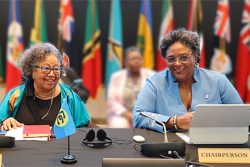CARACAS, (Reuters) – Venezuela’s new economic vice president yesterday urged an end to what he termed alarmism over the OPEC country’s finances and said it had enough experience to emerge from its current crisis.
Venezuelans are reeling from annual inflation thought to be in triple digits, a deep economic recession and shortages of basic goods, which have been aggravated by the tumble in oil prices.
President Nicolas Maduro, who blames the woes on an “economic war” he claims businessmen are waging against his socialist government, appointed Luis Salas, 39, a hard-line sociologist, to lead the economy on Wednesday.
“In Venezuela we have the background and accumulated experience to overcome this situation,” Salas said in an interview with regional broadcaster Telesur.
In the past Salas has argued against the idea that excessive printing of money causes inflation – an almost universally accepted tenet of macroeconomics. He insists prices rise primarily because corporations seek excessive profit margins.
Salas’ appointment appears to signal a break with the Socialist Party’s promises for some market-friendly reforms last year, which ended in aborted efforts to liberalize cumbersome currency controls.
“We have to leave ‘catastrophism’ aside,” Salas said. “This is not the worst economic crisis Venezuela has gone through. The worst one was the prolonged crisis during the 1980s and 1990s.”
In the mid-1990s, inflation peaked at more than 100 percent.
Maduro last year said inflation would be near 100 percent in 2015 but the central bank has not published monthly figures for a year.
Opposition lawmakers want to pressure the bank into revealing data on inflation and gross domestic product, which has also not been published for a year.
Two-time presidential candidate Henrique Capriles said yesterday that annual inflation in 2015 reached 270 percent. He did not cite a source for his figure but in the past has frequently cited central bank statisticians on inflation.









